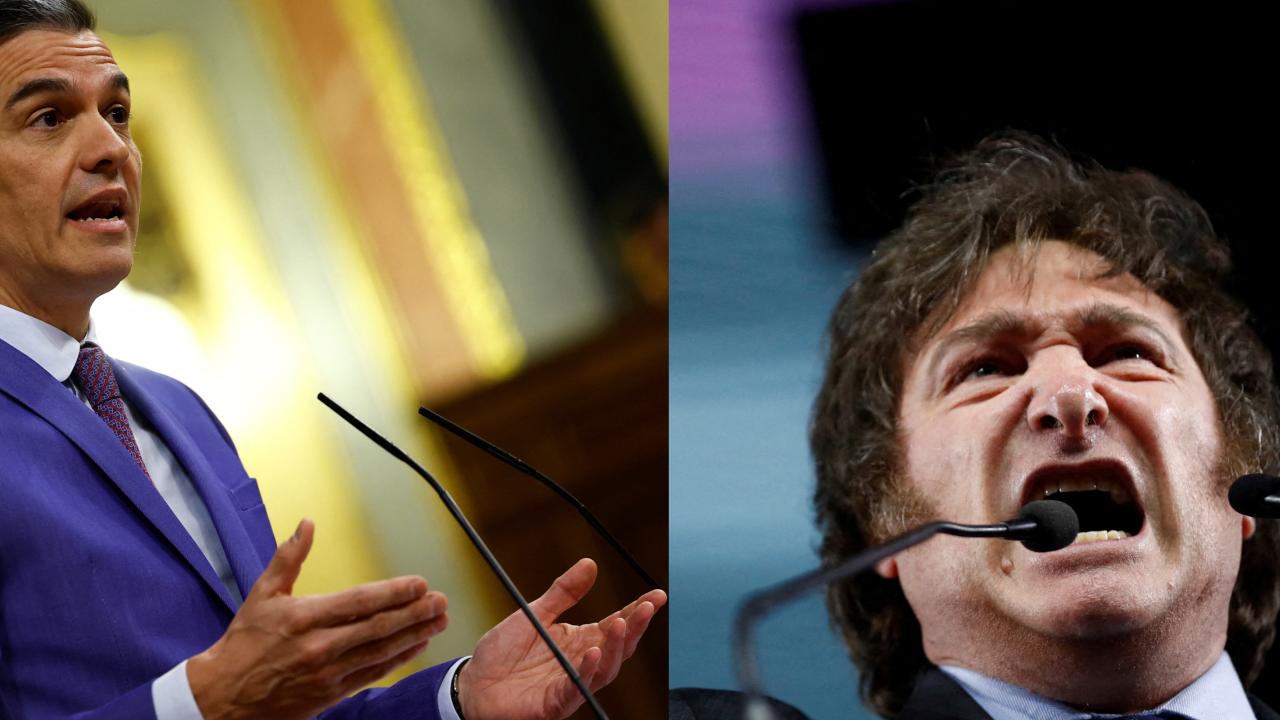
The harsh verbal exchange between Javier Milei and the Spanish government of Pedro Sánchez has put in check a relationship linked to key sectors such as the food industry, hydrocarbons and banking.
“Spain demands a public apology from Mr. Milei. If these apologies are not made, we will take all the measures we believe appropriate to defend our sovereignty and our dignity.” These were the words of José Manuel Albares, Spanish Foreign Minister, in response to a controversial speech by President Javier Milei at a convention of the ultra-conservative Vox party on May 19.
During his special participation, the Argentine president alluded to the complaints that accuse Begoña Gómez, wife of Spanish President Pedro Sánchez, of leading an influence peddling network in the public bidding sector. Milei called Gómez “corrupt,” which generated a turning point in the already tense relations between Madrid and Buenos Aires.
Previously, on May 3, Óscar Puente, Spanish Minister of Transport, had accused Milei of using drugs for his inflammatory statements against Sánchez. Such an exchange of insults and accusations has led to this May 21, Albares announcing the definitive withdrawal of the Spanish ambassador from her duties in Argentina. It is a decision that implies the possible breaking of diplomatic relations, which would affect commercial ties between both nations.
HYDROCARBONS AND SPANISH BANKING ARE PROTAGONISTS
To begin with, 117 Spanish companies currently operate in Argentina with participation, subsidiary or branch, according to data from the Spanish Foreign Trade Institute (ICEX). This is a figure that could increase in the future given Milei's favorable stance on private investment. In fact, the libertarian leader had met at the Vox event with representatives of Telefónica, Iberia, as well as the BBVA and Santander banks.
However, the firms did not take long to show their rejection of the libertarian economist's attacks on Sánchez and his wife. Only time will tell if this position remains in the gestures and does not transcend the arrival of financial opportunities to Argentina. But the income and profits at stake are not negligible: in June 2023, BBVA, Santander, Telefónica and Spanish construction companies totaled an investment of 18,322 million euros (US$ 19,911 million), according to ICEX.
In turn, the organization assures that Argentina is the ninth largest destination for Spanish investment, with 3.29% of the total. The main sectors are the extraction of oil and natural gas (39.2%), financial services (12%), manufacturing of iron and steel products (9.1%), telecommunications (8.8%) and manufacturing of other non-metallic mineral products (5.9%).
This report is reflected in the profile of the Spanish companies that met with Milei. In this group, Naturgy stands out, an energy firm that arrived in Argentina in 1992 through its subsidiary Naturgy BAN. Today, it has become the second gas distributor by number of clients, holding 17.3% of total sales in the residential and commercial market.
Another protagonist of the Argentine economy is the aforementioned Banco Santander: the entity has confirmed that Argentina contributes 3.5% to the group's total contributed profit. However, high inflation has affected its operations significantly, to the point that during the first quarter of 2024 its profits fell 27.2% to 101 million euros (US$ 109 million).
Despite the possible impact of the diplomatic rupture, this Tuesday the 21st, the Spanish Minister of Economy, Commerce and Business, Carlos Body, put a cold shoulder on the situation. "We send a message of tranquility to our companies so that they know that they can count on the Government of Spain to help and assist them, in this case, in their commercial and financial relations in Argentina," Corpo promised in a press conference.
A CLOSE BUSINESS RELATIONSHIP
Regarding the trade balance of the River Plate country with Spain, a positive balance is usually recorded. According to Indec figures, in 2023, Argentina obtained a surplus of US$ 180 million, while in 2021, profits of US$ 763 million were achieved. These are notable numbers, if we take into account that we must go back to the 1990s to find negative balances in the trade relationship between Argentina and its “motherland.”
Regarding the products shipped, Spanish companies usually purchase Argentine goods such as shrimp and prawns; soy flour and pellets; soy oil; olive oil and hake fillets. Thus, the European country uses this commercial link as a tool to enhance its food industry. On the other hand, from Spain, Argentine economic actors mostly buy inputs and manufactures linked to transportation: motor vehicles, parts and accessories, tar, fishing boats, among others.
Likewise, the worsening of Argentina's economic crisis has tightened financial dependence on international organizations and developed countries, including Spain. For example, in June 2023, Alberto Fernández's government signed bilateral agreements with the Iberian country, France and Sweden, all members of the Paris Club. The objective was to refinance the current debt of Buenos Aires with this institution that helps renegotiate the external debts of debtor countries with payment difficulties.
On the other hand, Spain is one of the nations that approves the ratification of the free trade agreement between the European Union (EU) and Mercosur, despite the rejection of important partners such as France.
Although Milei has repeatedly shown his opposition to Argentina's continuity in the regional bloc, last February, Diana Mondino, his foreign minister, met with his Spanish counterpart to discuss the possible terms of the agreement. Will libertarian ideology or the search for urgent solutions finally prevail? It is not yet known: with Milei, all the cards are on the table.









